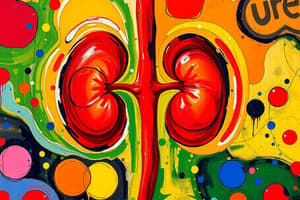Podcast
Questions and Answers
Which organ is primarily responsible for filtering blood and producing urine?
Which organ is primarily responsible for filtering blood and producing urine?
- Liver
- Kidneys (correct)
- Skin
- Lungs
What substance is converted from ammonia in the liver for safer excretion?
What substance is converted from ammonia in the liver for safer excretion?
- Creatinine
- Bile
- Urea (correct)
- Carbon Dioxide
Which component of the urinary system stores urine until it is excreted?
Which component of the urinary system stores urine until it is excreted?
- Bladder (correct)
- Urethra
- Ureters
- Nephrons
What is the primary function of nephrons in the kidneys?
What is the primary function of nephrons in the kidneys?
Which waste product is primarily excreted by the lungs?
Which waste product is primarily excreted by the lungs?
Which hormones are involved in the regulation of excretion by the kidneys?
Which hormones are involved in the regulation of excretion by the kidneys?
What condition is characterized by painful urination and is caused by bacterial infections in the urinary tract?
What condition is characterized by painful urination and is caused by bacterial infections in the urinary tract?
Why is excretion vital for maintaining homeostasis in the human body?
Why is excretion vital for maintaining homeostasis in the human body?
Flashcards are hidden until you start studying
Study Notes
Life Science: Excretion in Humans
-
Definition of Excretion
- The process by which waste products are removed from the body.
- Vital for maintaining homeostasis.
-
Main Organs Involved in Excretion
- Kidneys
- Filter blood to remove urea, excess salts, and water.
- Produce urine, which is stored in the bladder.
- Liver
- Converts ammonia (toxic) into urea (less toxic) for excretion.
- Plays a role in breaking down substances and detoxifying.
- Lungs
- Excrete carbon dioxide (waste of respiration).
- Function in acid-base balance by regulating blood pH.
- Skin
- Excretes sweat, which contains water, salts, and small amounts of urea.
- Helps regulate temperature and maintain hydration.
- Kidneys
-
Kidney Function and Structure
- Nephrons
- Functional units of the kidney that perform filtration.
- Composed of renal corpuscle (glomerulus + Bowman's capsule) and renal tubule.
- Filtration Process
- Blood is filtered in the glomerulus.
- Formation of filtrate, which is converted to urine as it passes through renal tubules.
- Reabsorption and Secretion
- Essential nutrients and water are reabsorbed back into the bloodstream.
- Additional wastes are secreted into the tubule for excretion.
- Nephrons
-
Urinary System
- Components
- Kidneys, ureters, bladder, urethra.
- Function
- Transport and store urine until excretion.
- Components
-
Regulation of Excretion
- Hormonal control (e.g., aldosterone, ADH) and nervous system influence.
- Homeostasis maintained by regulating blood volume, electrolyte balance, and pH levels.
-
Common Excretory Disorders
- Kidney Stones
- Calcium, uric acid, or struvite deposits that can cause pain and block urine flow.
- Urinary Tract Infections (UTIs)
- Bacterial infections that can lead to painful urination and other complications.
- Chronic Kidney Disease
- Progressive loss of kidney function over time, requiring dialysis or transplantation in severe cases.
- Kidney Stones
-
Importance of Excretion
- Essential for removing toxic substances from the body.
- Maintains fluid and electrolyte balance.
- Plays a role in overall metabolic waste management.
Excretion in Humans
- Excretion - the process of removing waste products from the body. It is essential for maintaining homeostasis.
- Organs involved in Excretion
- Kidneys: filter blood to remove waste products like urea, excess salts, and water. They produce urine, which is stored in the bladder.
- Liver: converts ammonia (toxic) into urea (less toxic) for excretion. It also breaks down substances and detoxifies the body.
- Lungs: excrete carbon dioxide (waste of respiration), and help to regulate blood pH.
- Skin: excretes sweat containing water, salts, and small amounts of urea. It also helps regulate temperature and maintains hydration.
Kidney Function and Structure
-
Nephrons are the functional units of the kidney. Each nephron consists of a renal corpuscle and a renal tubule.
- Renal Corpuscle: contains the glomerulus, a network of capillaries where blood filtration occurs, and Bowman's capsule which surrounds the glomerulus.
- Renal Tubule: consists of different segments involved in reabsorption and secretion.
-
Filtration Process:
- Blood is filtered in the glomerulus.
- The filtrate, produced from the blood, is then converted into urine as it passes through the renal tubules.
-
Reabsorption and Secretion:
- Essential nutrients and water are reabsorbed back into the bloodstream from the filtrate.
- Additional wastes are secreted into the renal tubules for excretion.
Urinary System
- Components: Kidneys, ureters, bladder, urethra.
- Function: Transport and store urine until excretion.
Regulation of Excretion
- Hormonal Control: Hormones like aldosterone and ADH regulate blood volume, electrolyte balance, and pH levels.
- Nervous System: The nervous system also plays a role in regulating excretion.
Common Excretory Disorders
- Kidney Stones: Calcium, uric acid, or struvite deposits can form in the kidneys, causing pain and blocking urine flow.
- Urinary Tract Infections (UTIs): Bacterial infections can cause painful urination and other complications.
- Chronic Kidney Disease: Progressive loss of kidney function over time. In severe cases, dialysis or transplantation may be required.
Importance of Excretion
- Removes toxic substances from the body.
- Maintains fluid and electrolyte balance.
- Plays a role in metabolic waste management.
Studying That Suits You
Use AI to generate personalized quizzes and flashcards to suit your learning preferences.




